The OGP community is made up of thousands of relentless, inspiring, and deeply committed reformers striving to make a difference. To recognize reformers at the forefront of advancing open government, OGP launched an award for “Inspirational Reforms” at the 2023 OGP Global Summit in Tallinn, Estonia.
Thank you to those who applied for the 2023 Open Government Awards. We received 47 applications from national members and local members all around the world. See the recipients of the 2023 Open Government Awards below.
Award Winners
NATIONAL
- Africa & the Middle East: Ghana – Public Accounts Committee and Audit Reports
- Americas: Brazil – Panorama do Legislativo Municipal
- Asia-Pacific: Indonesia – Expanding Legal Aid for Vulnerable Persons and Groups
- Europe: Portugal – Transparency Plus Portal
LOCAL
- Africa & the Middle East: Nandi, Kenya (tied) – County Open Data Desk
- Africa & the Middle East: Tarkwa-Nsuaem, Ghana (tied) – Youth Entrepreneurship and Women Empowerment Programme
- Americas: Contagem, Brazil – Aqui tem remédio
- Asia-Pacific: Yerevan, Armenia – Green Seal-Green Deal initiative
- Europe: Aragon, Spain (tied) – Gobierno Fácil
- Europe: Glasgow, UK (tied) – Citizen Power
Honorable Mentions
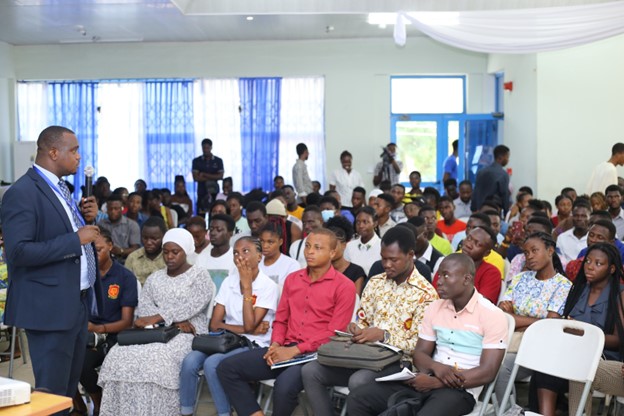
Ghana: Public Accounts Committee and Audit Reports
2023 Open Government Award Winner – Africa, National
Audit reports consistently show that Ghana is losing huge sums of money through corruption and weak financial management systems. This issue persists as audit recommendations are largely not implemented due to the weak implementation capacity of Ministries, Departments and Agencies (MDAs).
As part of a significant restructuring of the internal audit system, one of the measures the Internal Audit Agency of Ghana took is to establish 597 Audit Committees for prompt and effective implementation of the Auditor General’s recommendations. Naming and shaming government agencies in the national newspaper for defaulting in their submission of Risk Based Annual Audit Plans led to a significant increase in the subsequent submission. In collaboration with the Economic and Organised Crime Office of Ghana (EOCO), the Internal Audit Agency is prosecuting four cases of financial irregularities. By introducing these audit committees, Ghana has taken a giant leap towards enhancing accountability, transparency, and financial management within the public sector.
Themes: Anti-corruption
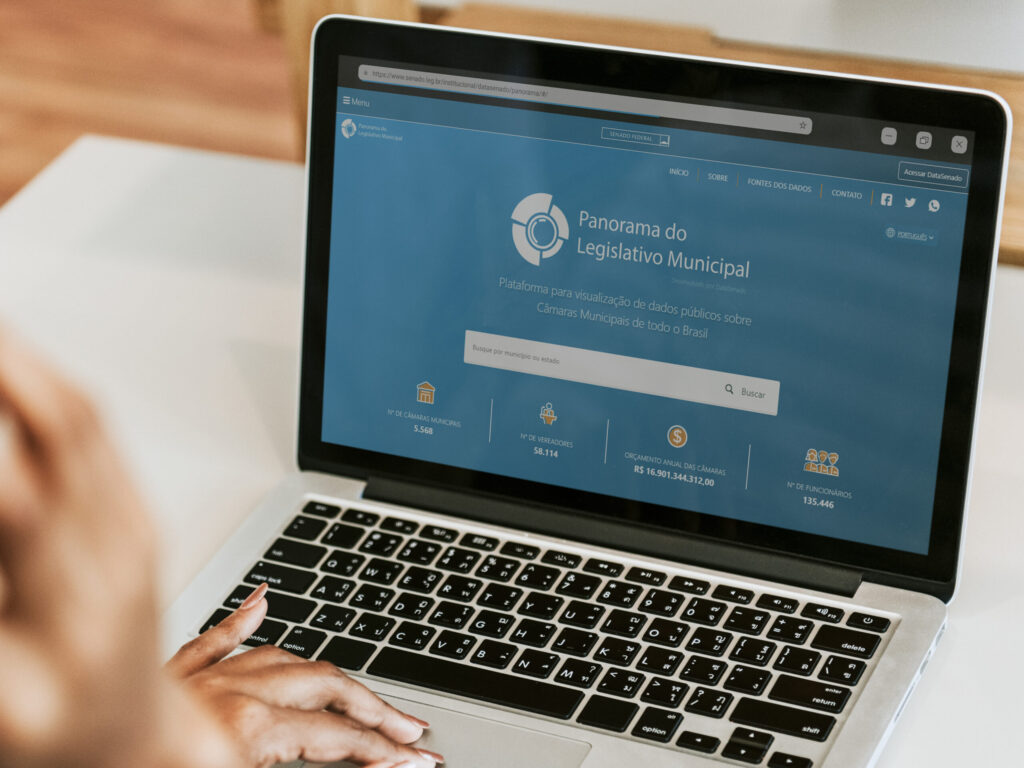
Brazil: Panorama do Legislativo Municipal (Brazilian Local Legislatures Overview)
2023 Open Government Award Winner – Americas, National
Data from over 5,000 of Brazil’s Local Legislatures (City Councils) has been scattered and inaccessible to citizens.
Panorama do Legislativo Municipal gathers information from the Local Legislatures across 5,568 of Brazil’s municipalities and offers tools for citizens to understand their work and compare it with the legislatures of other localities, thus exercising more effective social oversight. The platform is visually attractive and functional and presents data such as public finances and demographics in an interactive dashboard. Widely visited across the country, the platform has generated public debate on issues like the low participation of women and black population in Local Legislatures and the excessive spending of some of these bodies.
Themes: Digital technologies, Engaging different branches of government
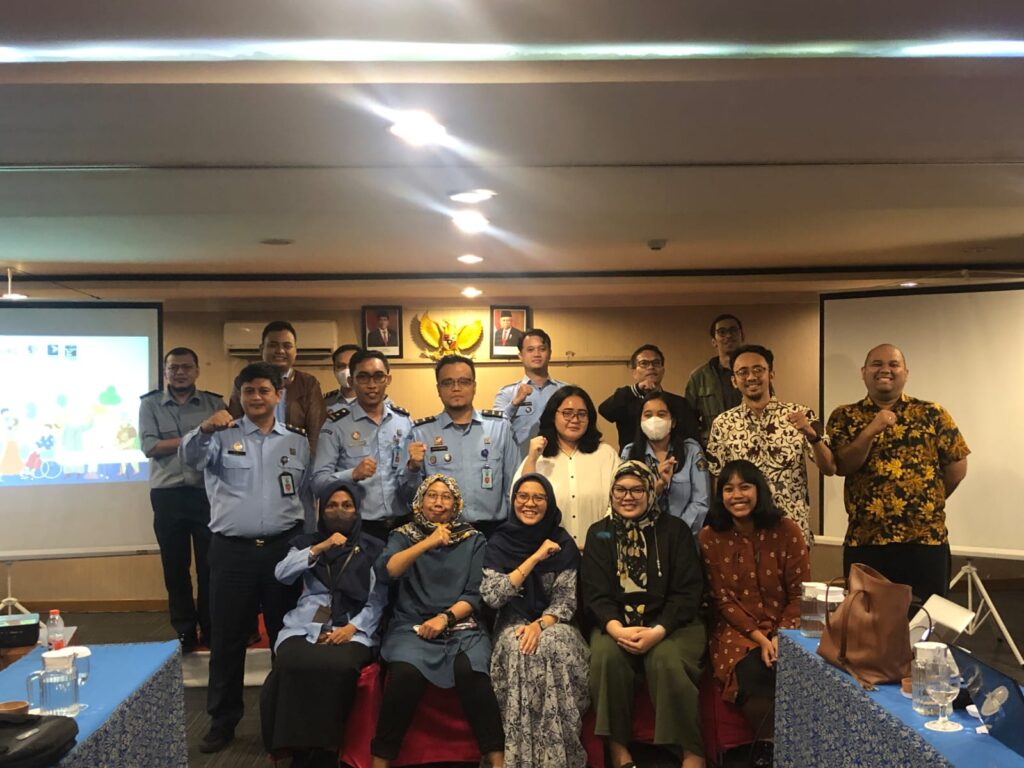
Indonesia: Expanding Legal Aid for Vulnerable Persons and Groups
2023 Open Government Award Winner – Asia-Pacific, National
Vulnerable persons and groups are prone to face more obstacles in accessing justice.
The Government of Indonesia allocates a portion of the national budget directly to communities through Legal Aid Organizations to provide litigation and non-litigation services for the economically-disadvantaged population. But vulnerable persons and groups are prone to face more obstacles in accessing justice. For instance, only 8.7% of women undergoing judicial proceedings received legal assistance while only 0.4% had representation.
In collaboration with civil society and citizens, the Ministry of Law and Human Rights (MLHR) introduced three reforms to address this challenge: ensuring standardized assessments of vulnerability and provision of services by legal aid providers, expanding funding for legal aid to cover non-litigation needs of vulnerable groups, and revising the Legal Aid Law to target vulnerable groups. Throughout 2018-2022, approximately 73,000 individuals received free legal aid. In 2022, recipients included over 2,000 stay-at-home mothers, 1,545 unemployed persons, 330 children, 1,001 farmers, and 873 trade workers. The reforms underway will make legal aid services even more inclusive.
Themes: Justice, Inclusive participation in policymaking
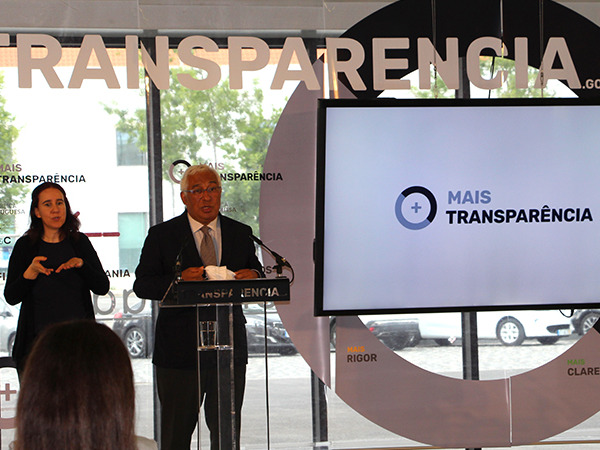
Portugal: Transparency Plus Portal
2023 Open Government Award Winner – Europe, National
In Portugal, most public data portals publish tabular data, which makes it challenging for the general public not versed in data science to exercise oversight over public administration bodies.
Transparency Plus Portal provides information on public expenditure and investments and its impact on education, health, innovation and digital transition, job creation, poverty alleviation, international competitiveness and climate change. Its design focused on citizens’ needs supported by several iteration tests with different user profiles and stands out for its ease of use. The portal provides 1) relevant indicators that are in line with the nature, structure, and complexity of the data (available on the Portuguese open data portal, dados.gov.pt); and 2) effective communication tactics based on current data visualization and storytelling approaches, fostering active audits of public actions and active citizenship. The Portal is managed by a cross-sectoral team of the Portuguese public sector under the coordination of the Administrative Modernisation Agency, and it involves 15 different public entities at every development sprint. The portal has reached over a half a million views and is visited by several other countries. It was audited and awarded the goal seal of accessibility and usability, and is easily replicable as it is Open Source based.
Themes: Anti-corruption, Digital Technologies, Engaging different branches of government
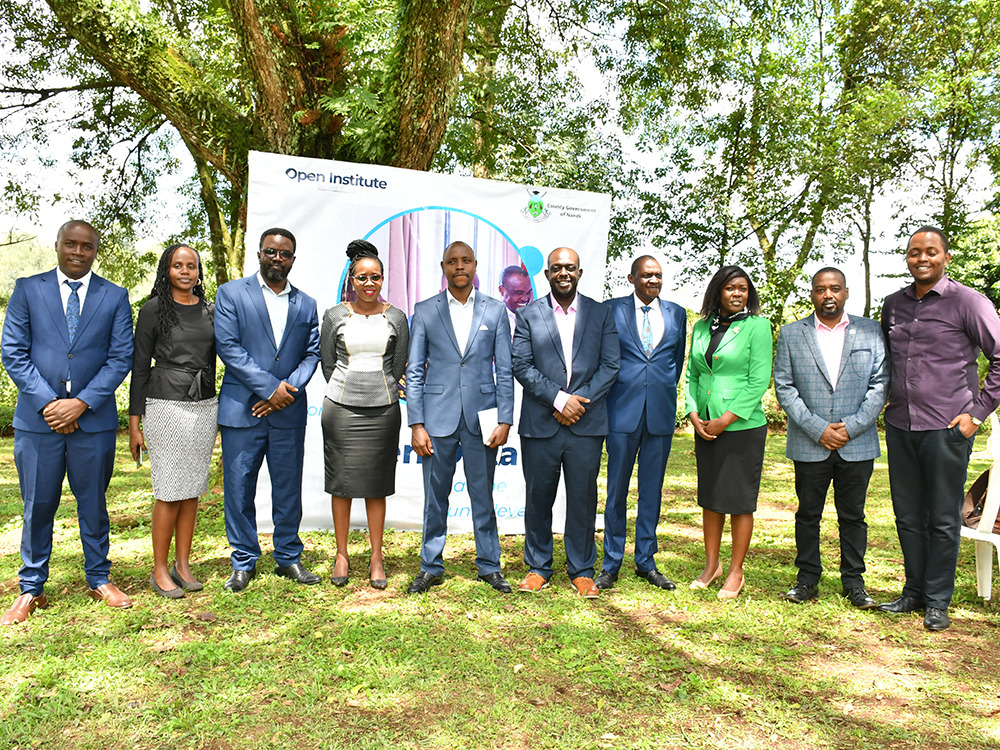
Nandi, Kenya: County Open Data Desk
2023 Open Government Award Winner – Africa and the Middle East, Local (tied)
Citizens in Nandi County have not been able to monitor the county’s performance and hold the government accountable.
The Nandi Data Desk solved this problem by providing a centralized platform for tracking and comparing the county’s performance in different sectors, from ward level to county level. It was designed using a collaborative approach that involved partners and stakeholders from the Civil Society network in Nandi, as well as the government.
Citizens can now access and use data for better trend monitoring, budget development, and engagement. The platform’s data has been used to inform policy and decision-making. It has eliminated the need for multiple data collection efforts and avoided duplication, and as a result saved taxpayer money by reducing the cost of data collection and analysis. The collaborative approach used in designing the platform can be replicated in other contexts to increase buy-in and ownership of similar platforms.
Themes: Digital technologies
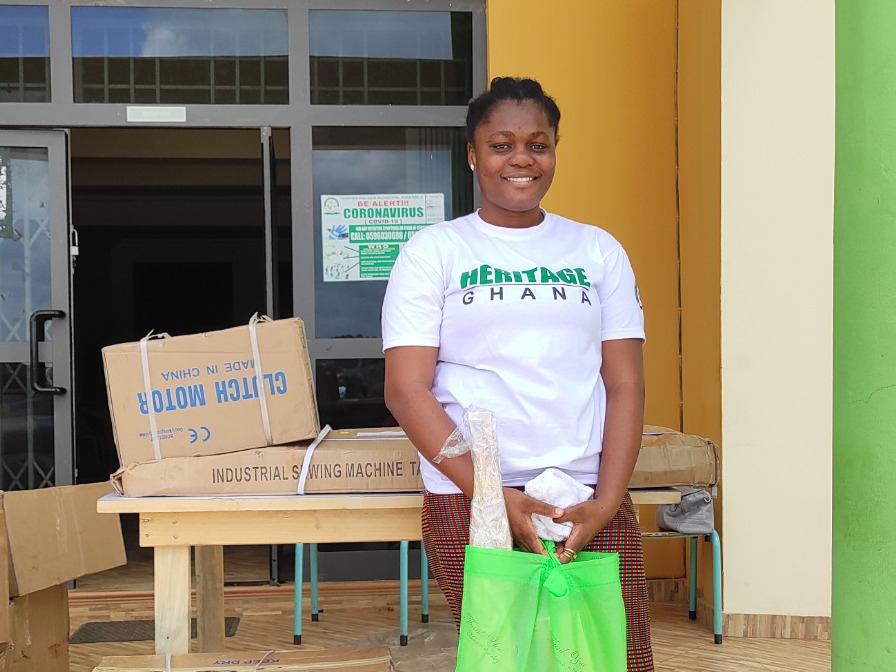
Tarkwa-Nsuaem, Ghana: Youth Entrepreneurship and Women Empowerment Programme
2023 Open Government Award Winner – Africa and the Middle East, Local (tied)
Indiscriminate mining, the lack of enforcement of mining regulations, and an absence of alternative income generating jobs have led to an increase in social agitation from youth in Tarkwa-Nsuaem.
A consultation between the Municipal Assembly and the National Youth Authority led to the establishment of The Youth Entrepreneurship and Women Empowerment Programme, which dedicated 10% of municipal funds to equipping youth and women with employable skills in areas of engineering, agriculture and commerce. About 65% of the youth engaged have opted for acquisition of requisite skills to improve their condition of living. In its first pilot, 50 persons across the municipality were selected and given technical training, start-up tools, and a capital amount to start their businesses. Women, school dropouts, and persons with disabilities were given preference. The program has visibly impacted youth employment outcomes and improved the socio-economic conditions of women. Traditional leaders, assembly members and the civil society have called for the program to be scaled up to cover a larger number of participants.
Themes: Civic space, Inclusive participation in policymaking
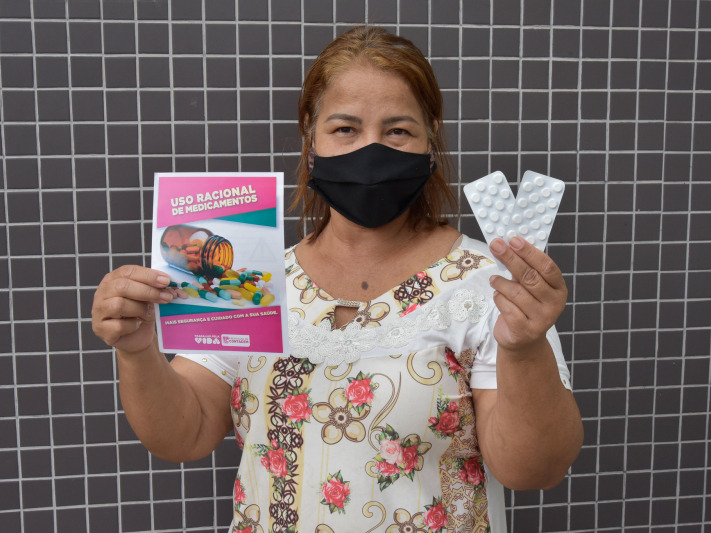
Contagem, Brazil: Aqui tem remédio
2023 Open Government Award Winner – Americas, Local
Municipal pharmacies in Contagem face problems of shortage of several essential drugs.
Aqui tem remédio is a digital platform that enables citizens who rely on municipal pharmacies to track the availability of medicines across pharmacy units. More than 13,000 people seek out municipal pharmacies to access medication for blood pressure, diabetes, antibiotics, bronchodilators, etc. The platform was created using an existing simple supply control spreadsheet that was maintained in all pharmacies. The availability of medicines available is updated in real-time and geo-referenced.
Within four months of its launch, the platform saw an increase in user access and served 6,000 more prescriptions. The number of user complaints to the Ombudsman on the Pharmaceutical Assistance sector also reduced by half during this period. According to data from the Department of Information Technology, more than 1,000 people access the platform daily. The platform has enormous potential to be scaled up and replicated in other municipalities and states.
Themes: Digital technologies
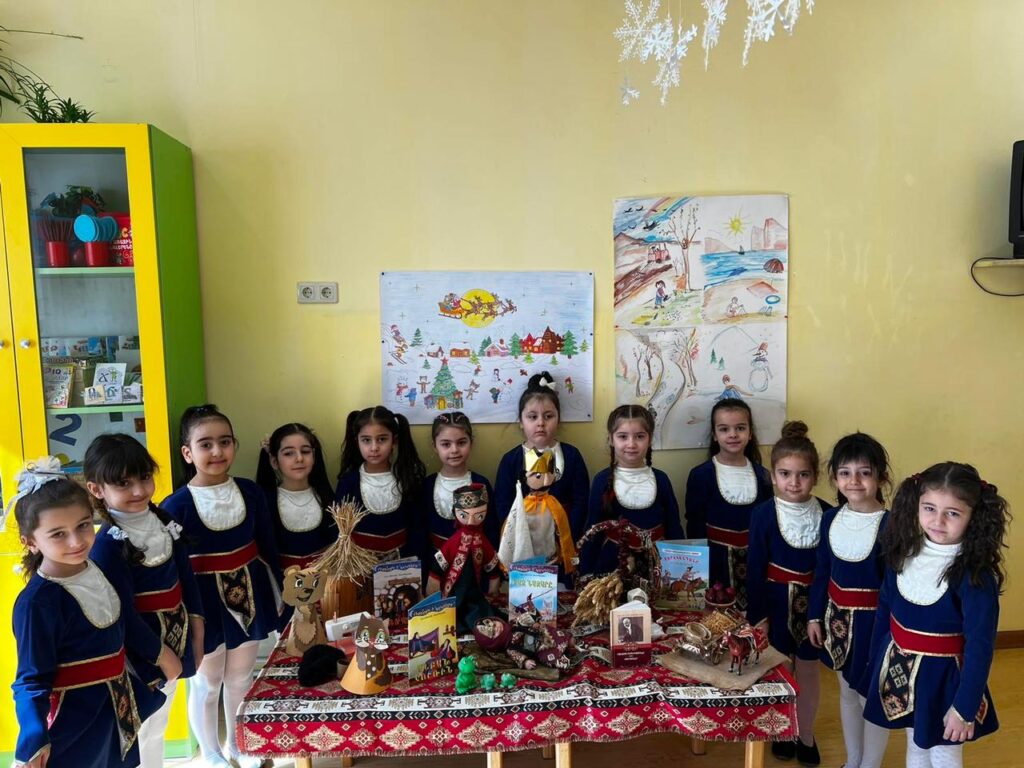
Yerevan, Armenia: Green Seal-Green Deal initiative
2023 Open Government Award Winner – Asia-Pacific, Local (tied)
Over 400 public sector organizations in Yerevan are not guided by green procurement practices in the purchase of goods and services.
The “Green Seal-Green Deal” incentivizes the institutions under the municipal authority to follow green procurement, and implement energy-saving and cost-effective measures. One of these institutions – Kindergarten No. 92 was recognized as the first winner of the Green Seal-Green Deal initiative. The kindergarten serves more than 200 children and also runs the only day care center for children with special needs in the Republic of Armenia. The budget allocation for Kindergarten No.92 was almost entirely being spent on utility costs to address heat loss due to old doors and windows. Kindergarten no. 92 proposed replacing them with energy efficient and cost efficient options, earning them the Mayor’s Certificate or the Green Seal. Issuance of the “Green Seal” certificate in this format is unprecedented, innovative and was carried out for the first time in Armenia. It contributed to more accountable spending and an increased level of awareness of community organizations and institutions regarding projects aimed at energy-saving, energy-efficient and nature-based solutions.
Themes: Climate change
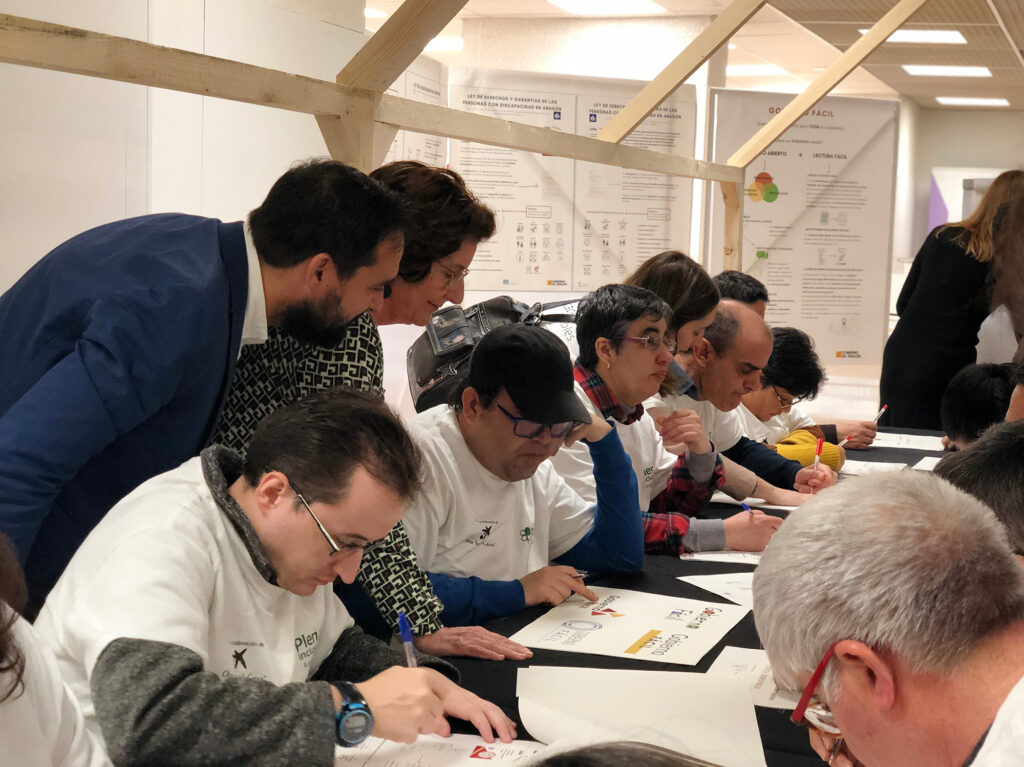
Aragon, Spain: Gobierno Fácil
2023 Open Government Award Winner – Europe, Local (tied)
Language used by the public administration in public consultations is often too technical, leaving out youth, non-Spanish residents, people with disabilities and the elderly from participatory processes.
Gobierno Fácil or Easy Government invites people with disabilities and socially vulnerable people to redesign legal and administrative texts using easy reading (pictograms, simple words, short paragraphs) and create simpler and clearer products for all audiences. With their special glasses to see the world and their unapologetic advice, Aragon designs better public services.
People with functional diversity, such as intellectual disabilities or mental health illnesses, have been able to participate for the first time in public issues. More than a 100 people with disabilities have worked hand in hand with public officials to make public services more accessible, and their contributions can positively affect more than 100,000 people with disabilities who live in Aragon. In addition to the action plans and laws, many disability recognition sentences, school enrolment forms, consumer and justice guides and brochures and classic books have also been adapted for easy reading. Other departments of the Government of Aragon are beginning to adapt their texts and forms to easy reading.
Themes: Inclusive participation in policymaking
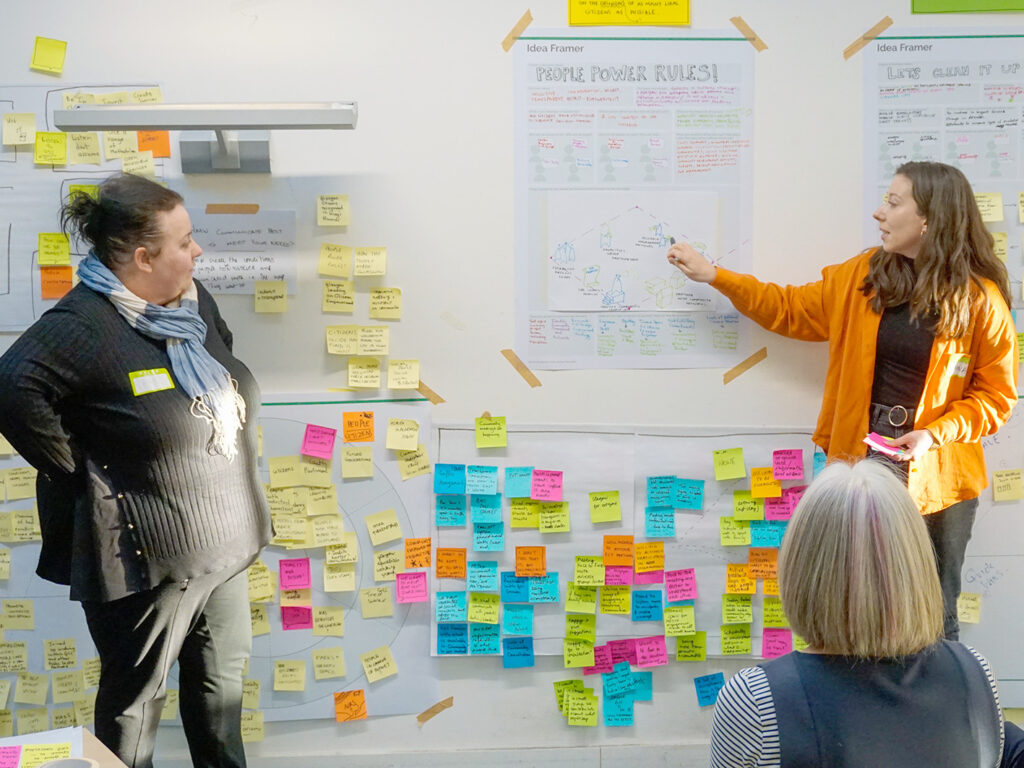
Glasgow, UK: Citizen Power
2023 Open Government Award Winner – Europe, Local (tied)
Glasgow is working to devolve power at a neighborhood level, enabling all citizens to be heard, included, and in control of the things that directly affect their lives.
In collaboration with the Centre for Civic Innovation, Glasgow is exploring models of Citizen Power that are embedded in the way the city functions to create sustainable changes. This includes understanding people’s values, attitudes and behaviors towards local and city-wide policy and services, and applying design thinking, co-creation, and data science to achieve successful outcomes with stakeholders and resources aligned. One of these models is a decision-making model for Neighborhoods to decide how £1m available in Glasgow’s Neighbourhood Infrastructure Fund can be deployed for infrastructure improvements. These models are critical in informing Glasglow’s Open Government priority on participatory democracy and can be scaled up and applied to other policy priorities, services and public sector partners.
Themes: Inclusive participation in policymaking
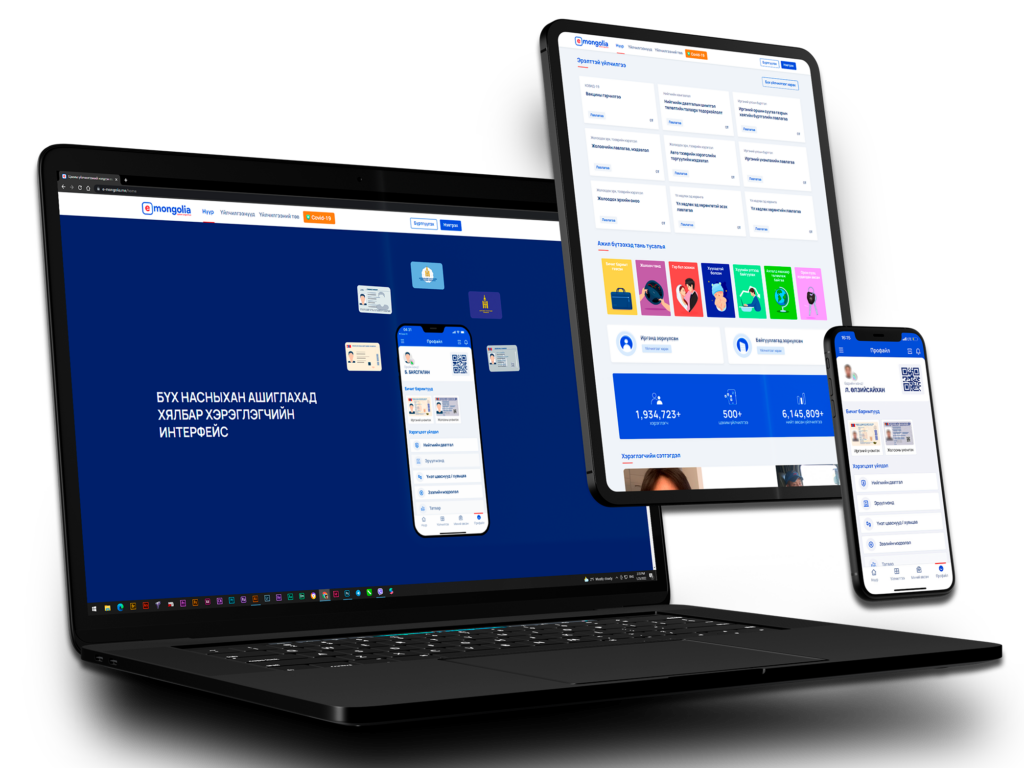
Mongolia: The E-Mongolia, Ministry of Digital Development and Communications
2023 Open Government Award – Honorable Mention
In 2018, specialists from more than 20 government institutions provided public services through multiple windows, causing overcrowding, delays and posing a risk for bribery and bureaucracy.
Exasperated citizens from remote rural areas had to travel long distances (sometimes up to 250 km) and stay for several days until all government services were complete in province centers. E-Mongolia launched in 2020 and was developed based on the existing “KHUR” – state information exchange system, that aims to bring intergovernmental coordination to a new level and facilitate the access of public services to citizens. It was designed in consultation with engineers, representatives from government officials, civil society and the private sector.
As of May 2023, E-Mongolia had provided a total of 28 million services from 81 government institutions. 72% of all adult citizens of Mongolia use the system. People without access to the internet can visit any “Khurdan” 42 centers located in provinces or 44 centers in the capital city. The digital transition has saved citizens USD 27 million in indirect costs by transferring government services to electronic form, transportation related fees, time saved, and document preparation related costs.
Themes: Digital technologies
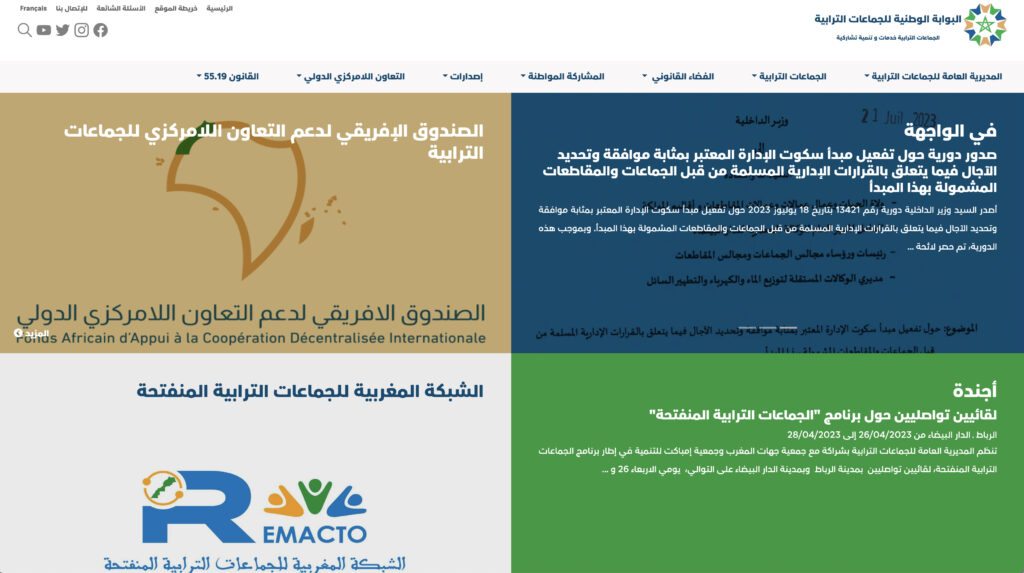
Morocco: Open Local Government Support Program
2023 Open Government Award – Honorable Mention
Morocco is aspiring to institutionalize open government principles in all local authorities in the country.
The Moroccan Network of Open Territorial Communities (REMACTO) was established by a partnership of government and civil society organizations to advance participatory governance at the local level, and institutionalize Local OpenGov. It serves as a forum for discussion, collaboration, and exchange of ideas among Moroccan local authorities for open local development. Currently comprising 66 local authorities (12 Regions, 4 Provinces, and 50 Communes), the network will be expanded to include nearly 1,600 local authorities.
The network has a dedicated digital space on the national portal of local authorities, allowing each member to create content on co-creation, co-monitoring and co-evaluation. The network develops the capacity of local authorities, elected officials, executives, and associations on the principles of openness and supports them in setting up mechanisms and tools, mobilizing experts to institutionalize open government in their communities. These strategies represent a novel and creative Moroccan-Moroccan endeavor, tailored to the circumstances and practicalities of the situation, while also factoring in the unique characteristics of each region.
Themes: Engaging different branches of government
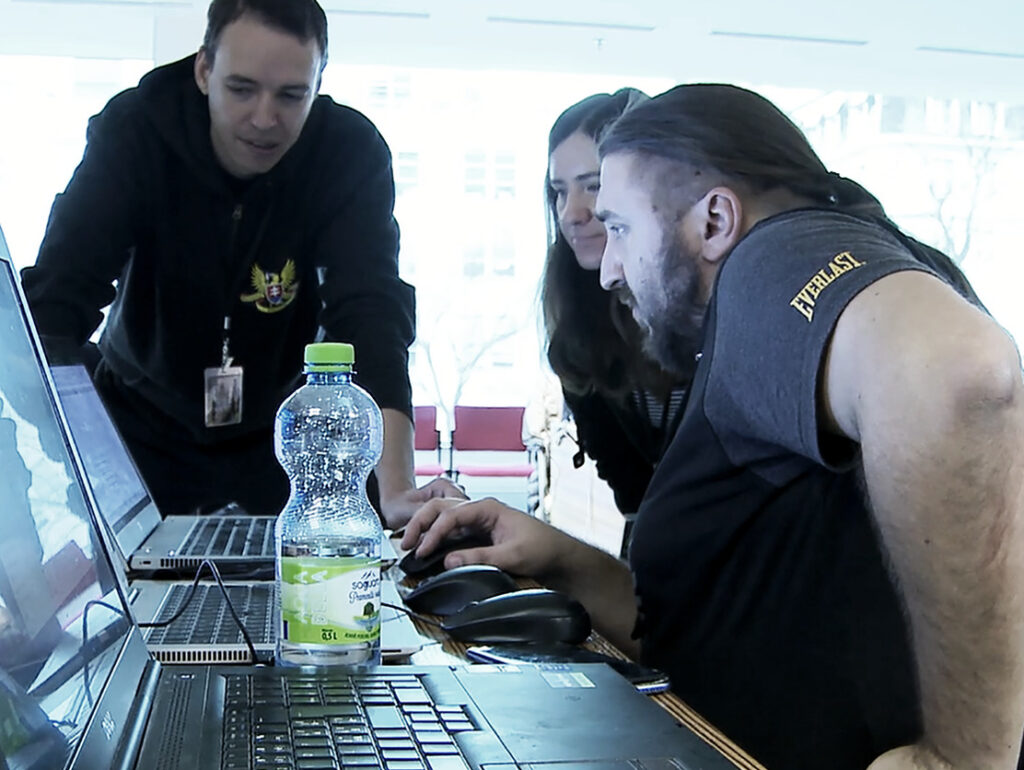
Slovak Republic: MuMap: Municipalities on Map
2023 Open Government Award – Honorable Mention
The lack of high quality audit related data for each municipality in the Slovak Republic prevents citizens from exercising accountability from municipal officials.
MuMap was built with the idea that every citizen could be the auditor of her/his municipality. It provides audit-related data on demographic and economic aspects such as EU funds, First Aid/COVID and primary schools etc from all 2890 municipalities and cities in Slovakia in the form of an interactive map. Complex economic and audit information is translated into a more accessible language to include the non-expert audience.
The application was built with free open-source software (R) during the 1st International Hackathon of Supreme Audit Institutions (2020). The innovation of the project lies in its understanding of the citizen as a clear partner of the audit institution and a “watchdog” of the municipality. Civil society has expressed interest in collaborating on MuMaP. It has also been covered in the media in the context of municipal elections and highlighted in the International Journal of Government Auditing. Its potential for replication and scaling to other geographies is high, particularly as the Supreme Audit Office holds the mandate to audit the self-government of municipalities and higher territorial units.
Themes: Anti-corruption, Digital technologies
Nomination Guidelines
All OGP countries and locals were encouraged to apply from April 17 to May 21, 2023.
(1) We encouraged submissions from any of the seven areas of the new OGP strategy listed below:
- Civic space: Protecting and expanding civic space policies.
- Inclusive participation in policymaking, specifically by working with gender groups, marginalized communities and youth.
- Anti-corruption: Policies that tackle grand corruption and kleptocracy—illicit financial flows and money laundering—and on public integrity.
- Digital technologies: Policies that target democratization and governance of digital tools, measures and tools to promote democracy, and data and digital transformation across other sectors of government.
- Climate change: Strengthening the transparency and accountability of domestic systems for managing climate finance, opening up climate-relevant data and information, and encouraging uptake of innovations to deepen participation in climate-related policies.
- Justice: Legal empowerment and access to justice, including expanding mechanisms for access to justice for communities and opening up justice institutions as well as leveraging the justice sector to strengthen other open government measures.
- Engaging different branches and levels of government and embedding open government principles in the parliament, judiciary, national-local integration, oversight institutions
(2) Submissions could be either of the following:
- Completed reforms which have shown strong early results
- New reforms that are innovative and have the potential to be scaled up
- Reforms in an OGP action plan
- Reforms outside the OGP action plan
(3) The government point of contact (PoC) from each OGP country and local could enter a submission. They were required to answer who from outside the government was consulted in the submission process.
(4) Each OGP member – national or local – was allowed a maximum of one submission.
Judging Process
A Summit Advisory Board recognized one country and one local winner for each of the four OGP regions – Europe, Africa, Americas and the Asia-Pacific. We also held space for ‘honorable mentions’. Winners received a travel scholarship to participate in the Global Summit during the first week of September.
The Summit Advisory Board was composed experts on open governance from civil society and governments from different regions to act as a Summit Advisory Board. It included: Anabel Cruz, (Institute for Communication and Development, Uruguay, OGP Civil Society Co-Chair), Kai Klandorf (Executive Director of the Network of Estonian Nonprofit Organizations), Blair Glencorse (Executive Director of the Accountability Lab), Jean Cardinal (OGP Point of Contact of Canada), Czarina Medina-Guce (Ateneo de Manila University, Philippines), Aidan Eyakuze (Executive Director of Twaweza East Africa), and Meri Harutyunyan (OGP Point of Contact of Yerevan).
The Summit Advisory Board used the following scoring criteria to judge the applications submitted.
| Criteria | Definition: Is/Does this project … ? | Scoring | Weight |
| NOMINATION | Demonstrates a credible process by which non-government actors were consulted in the submission of the reform. This criteria should receive a full score only If a letter of support has been submitted. | 1-4 – Outlines a process but no letter of support uploaded 5 – Credible process with a letter of support | 5% |
| PROBLEM | Clearly describes a problem and its urgency as it relates to the country/local context. Articulates specific target populations, institutions, policies or practices that would benefit from the problem being addressed. | 1 – Little to no articulation 5 – Timely issue to which we can specifically identify a group of beneficiaries | 25% |
| DESIGN | Clearly describes all of the processes, methods and approaches used in the reform; describes WHY this design is supposed to work in addressing the problem or has already worked. Gives the reader a clear idea of the unique context in which this reform was developed | 1 – Vague, ambiguous description of the approach 5 – Demonstrates systematic, sequenced and credible approaches to solving the outlined problem | 35% |
| INNOVATION OR IMPACT | Depending on the nature of submission. If the submission relates to an impactful reform: • Clearly demonstrates the results of the reform and backs it up with evidence (quantifiable metrics, qualitative descriptions of policy changes etc) If the submission relates to a new, innovative reform: • Clearly demonstrates how the reform will add value for a defined set of the population / solve a social problem, is fit-for-context, is cost/time effective. Demonstrates newness of the idea. Makes clear arguments on its potential for replication, scalability and adaptability | 1 – Not at all innovative / impactful 5 – Highly innovative / impactful | 35% |
| TOTAL | 100% |
